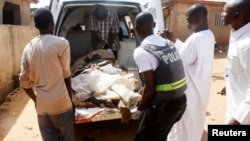ABUJA, NIGERIA —
Opposition groups in the northern Nigeria city of Kaduna are calling for the repeal of a ban on “meetings, rallies or assemblies” without police permission. Police maintain the ban is essential in times of political turmoil to maintain peace in a city with a history of political violence.
Kaduna state Police Commissioner Olofemi Adeleke told VOA the ban is a temporary measure - enacted by security forces, not lawmakers - to prevent political violence.
Cities all over the world require permits for some public gatherings, but this ban applies to all gatherings. For instance if you want to hold a meeting in a hotel, you have to obtain permission from the police before the hotel will rent you a conference room. Essentially this gives security forces the ability to decide who can have meetings, even in private.
Opposition and rights groups say if the ban is enforced, they will challenge it in the courts as unconstitutional.
Sulaiman Ahmed, the vice-chairman of the Civil Rights Congress of Nigeria, said, “Obviously the ban on social gatherings, or any political gathering, or either educational gathering except for the organization seek permission from the police or from the security agents is completely illegal, most especially in a democratic era.”
In the meantime, said Hafsat Mohammad Baba, an opposition party member, the ban has been working and events have been canceled over the past few weeks. Baba said that in her opinion, the ban was put into force by the ruling party ahead of the 2015 elections to prevent the opposition from gaining strength.
“People have the right to voice out how they feel about the government in power because that is what we call democracy," she said. "At the end of the day, they are supposed to go back to the drawing board to see what they’ve done wrong and why people are so much against them instead of banning meetings, conferences or any gatherings.”
The ban was put into place after fights broke out at a political rally in early October. In Kaduna, political quarrels can rapidly devolve into sectarian violence as political affiliations often divide along religious and ethnic lines.
Last year, nearly 100 people were killed in sectarian violence in Kaduna, after triple church bombings killed nearly 20 others. In 2011, more than 800 people were killed in fighting that broke out after the presidential election.
Yohanna Buru is a pastor and a local leader of interfaith initiatives. He said that as new elections loom, people should be holding more workshops and meetings, not fewer.
“They’re setting the issue of peace backwards. The reason why I’m saying this is this: since we need peace, if we don’t sit down and talk together, if we don’t sit down at the dialogue table and talk together, then what are we going to do?" asked Buru.
Buru agreed with security forces that rallies are extremely dangerous these days in Kaduna. He said the way to more prevent bloodshed, however, is not to stop the gatherings, but to secure them and to teach people how to meet in peace.
Ibrahima Yakubu contributed to this report from Kaduna.
Kaduna state Police Commissioner Olofemi Adeleke told VOA the ban is a temporary measure - enacted by security forces, not lawmakers - to prevent political violence.
Cities all over the world require permits for some public gatherings, but this ban applies to all gatherings. For instance if you want to hold a meeting in a hotel, you have to obtain permission from the police before the hotel will rent you a conference room. Essentially this gives security forces the ability to decide who can have meetings, even in private.
Opposition and rights groups say if the ban is enforced, they will challenge it in the courts as unconstitutional.
Sulaiman Ahmed, the vice-chairman of the Civil Rights Congress of Nigeria, said, “Obviously the ban on social gatherings, or any political gathering, or either educational gathering except for the organization seek permission from the police or from the security agents is completely illegal, most especially in a democratic era.”
In the meantime, said Hafsat Mohammad Baba, an opposition party member, the ban has been working and events have been canceled over the past few weeks. Baba said that in her opinion, the ban was put into force by the ruling party ahead of the 2015 elections to prevent the opposition from gaining strength.
“People have the right to voice out how they feel about the government in power because that is what we call democracy," she said. "At the end of the day, they are supposed to go back to the drawing board to see what they’ve done wrong and why people are so much against them instead of banning meetings, conferences or any gatherings.”
The ban was put into place after fights broke out at a political rally in early October. In Kaduna, political quarrels can rapidly devolve into sectarian violence as political affiliations often divide along religious and ethnic lines.
Last year, nearly 100 people were killed in sectarian violence in Kaduna, after triple church bombings killed nearly 20 others. In 2011, more than 800 people were killed in fighting that broke out after the presidential election.
Yohanna Buru is a pastor and a local leader of interfaith initiatives. He said that as new elections loom, people should be holding more workshops and meetings, not fewer.
“They’re setting the issue of peace backwards. The reason why I’m saying this is this: since we need peace, if we don’t sit down and talk together, if we don’t sit down at the dialogue table and talk together, then what are we going to do?" asked Buru.
Buru agreed with security forces that rallies are extremely dangerous these days in Kaduna. He said the way to more prevent bloodshed, however, is not to stop the gatherings, but to secure them and to teach people how to meet in peace.
Ibrahima Yakubu contributed to this report from Kaduna.




